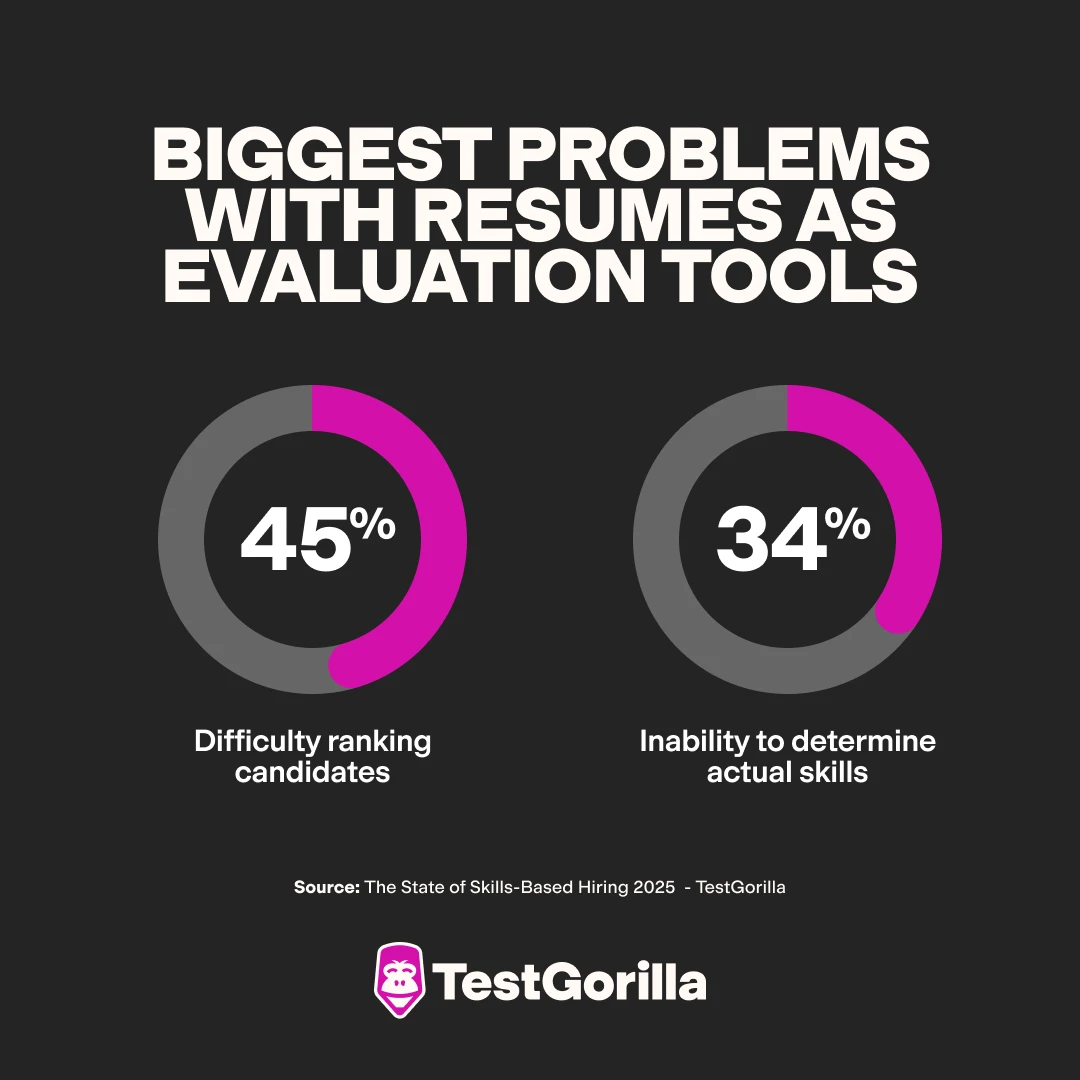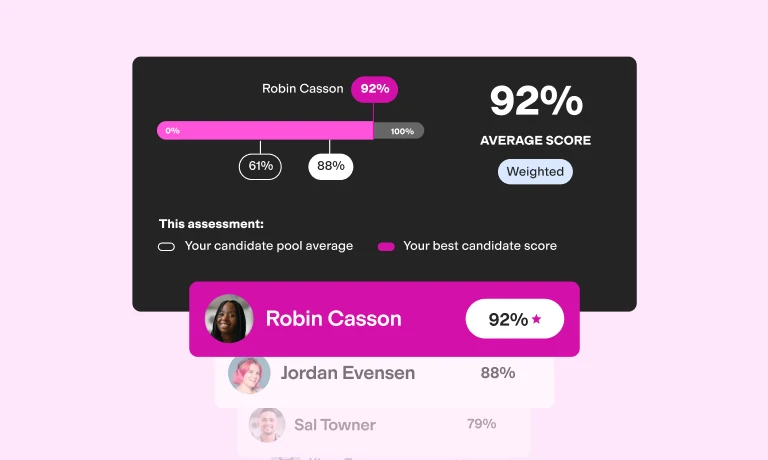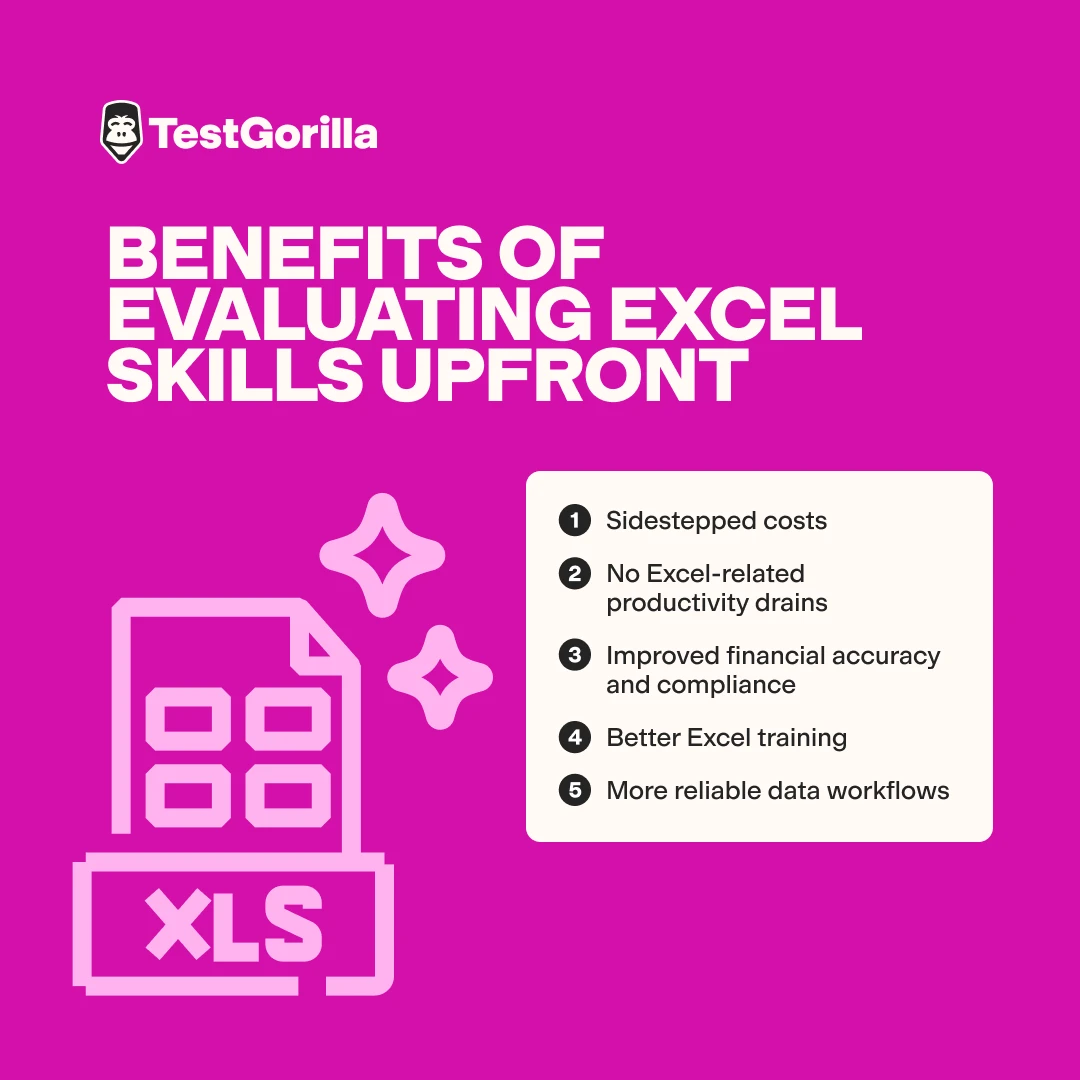“Excel proficiency” shows up in skills lists on nearly every resume – but too often, it’s an empty claim. Many hiring managers discover too late that a new hire can’t build a pivot table or automate a report. The result? Wasted hours, broken models, and bad decisions.
Resumes and interviews rarely separate true Excel experts from inflated claims – but skills-based testing does. Evaluations like TestGorilla’s Microsoft Excel (Advanced) test require candidates to prove their abilities through real-world tasks.
Let’s look at how this makes all the difference.
What Excel proficiency actually looks like
When hiring Excel experts, managers often write job descriptions that ask for “advanced Excel skills” without defining what that means. That vagueness leaves candidates to self-assess using different standards, creating huge gaps between supposed qualifications and actual ability.
To close those gaps and set realistic expectations for prospective talent, it’s key to understand three levels of Excel proficiency:
Proficiency level | Typical tasks | What it looks like in practice |
Beginner | Data entry, SUM/AVERAGE, simple charts | Keeping ledgers, formatting cells, and creating basic visuals |
Intermediate | PivotTables, XLOOKUP/IF, conditional formatting | Summarizing datasets, analyzing trends, and building moderately complex formulas |
Advanced | Power Query, Power Pivot, VBA/macros, data modeling, automation | Creating dashboards, connecting data sources, building scalable processes, and developing data models |
Moreover, what separates the novices from the experts isn’t just the knowledge of more functions – it’s systematic thinking. An intermediate user might update a monthly report by copying formulas, while an advanced user designs a dashboard that pulls in fresh data, runs calculations, and generates the formatted output automatically.
Why resumes and interviews can’t spot true Excel skill
Resume inflation is rampant
TestGorilla’s 2025 State of Skills-Based Hiring Report reveals that 86% of US employers have serious problems with resumes as evaluation tools. The biggest issues: difficulty ranking candidates (45%) and inability to determine actual skills (34%).
Thirty-nine percent of employers say they're “not sure if resumes are accurate,” and of those who were disappointed with recent hires, 33% say that candidates had misrepresented their abilities in their applications.
Excel skills are especially vulnerable to inflation. Because most hiring managers can’t quickly verify technical claims in interviews, candidates’ self-reported “proficiency” often goes unchecked.
This has certainly been the experience of Jennifer Buchholz, CEO of Engaging Geek. She tells TestGorilla, “As a Microsoft-certified trainer who delivers Excel training to hundreds of corporate employees each year, I’ve learned that self-assessment of Excel skills is almost always unreliable.”
Interviews lack predictive power
Excel’s complexity creates unique blind spots for traditional interviews. A candidate might confidently describe their “advanced formula” skills but really mean simple IF statements, while a true expert designs nested array formulas to handle multiple conditions. Another might claim Power Query expertise when, in fact, they’ve only ever used the basic import wizard.
This disconnect isn’t merely anecdotal. Research analyzing 85 years of personnel psychology found that unstructured interviews have a predictive validity of just 0.38 for job performance. Work sample tests, which directly measure job skills, achieve 0.54 validity, making them far more accurate.
In simple terms, interviews reward smooth talkers, while skills tests reward actual ability.
The best insights on HR and recruitment, delivered to your inbox.
Biweekly updates. No spam. Unsubscribe any time.
How Excel skills tests reveal genuine proficiency
Excel proficiency spans a vast range, from basic data entry to advanced financial modeling. Yet, as we’ve seen, most people claim the same “advanced” level – regardless of whether they can build a pivot table, write a macro, or just total a column with SUM.
Pre-employment Excel assessments eliminate this confusion by requiring candidates to perform real tasks.
Instead of describing their pivot table experience, candidates must build one from messy data. Instead of claiming VLOOKUP knowledge, they must troubleshoot a broken formula and recommend a better approach, such as XLOOKUP. In doing so, the tests reveal what an interview never can: how someone actually works with spreadsheets.
“Skills assessments are essential. They provide a clear, objective measure of what someone can actually execute in Excel – not just what they claim on a resume or demonstrate in a conversational interview.” – Jennifer Buchholz, CEO of Engaging Geek
Skills tests also expose common misconceptions that inflate self-assessed ability:
Some candidates think conditional formatting qualifies as “automation.”
Others confuse copying formulas down columns with actual dynamic calculations.
Some have used pivot tables but never created one from scratch or understood when they’re inappropriate.
Others claim “macro” experience but have only recorded simple actions, never written VBA.
These gaps are easy to hide in a resume but impossible to disguise when faced with practical tasks.
And that’s why Excel skills are hard to fake. Ask a candidate to build a dashboard that updates automatically when new data is added to the source sheet, and their actual proficiency becomes immediately apparent. Advanced users start with named ranges and structured tables. Intermediate users might attempt basic formulas but struggle with dynamic updating. Beginners often resort to manual copying and pasting.
Just as important, skills tests reveal how candidates think and solve problems. Advanced users think systematically about data structure before touching formulas. They plan for scalability and maintainability. Less-skilled users often jump straight to formulas without considering the broader implications, resulting in solutions that break when conditions change.
In short, a test for Excel skills doesn’t simply measure what functions someone knows. It uncovers problem-solving patterns and workflow habits that predict how candidates will perform in your workplace. That’s exactly the insight resumes and interviews can’t provide.
How to use Excel testing to meet your needs
Unlike programming languages with clear syntax rules, Excel proficiency exists on a spectrum where someone can be genuinely useful at intermediate tasks while being completely helpless with advanced features. That means your testing strategy needs to reflect the realities of the role.
Match your assessment to the role’s Excel depth
Your Microsoft Excel test for candidates should match the specific demands outlined in your advanced Excel job description.
Beginner roles need tests that cover basic data entry, simple formulas, and fundamental chart creation. Intermediate roles focus on pivot table creation, VLOOKUP proficiency, and conditional formatting applications. Expert roles require assessments that test dynamic range creation, data validation rules, and Power Query connections to multiple data sources.
Focus on Excel workflow thinking, not just functions
Your Excel hiring assessment should test workflow logic rather than memorized function syntax. Present candidates with messy, realistic datasets that mirror your actual business challenges. Then, watch how they approach data cleaning, organization, and analysis before diving into specific formulas.
Strong Excel candidates think about data structure first. They organize information in tables, use consistent naming conventions, and plan for future updates. Weak candidates, on the other hand, will jump straight to formulas without considering how their solutions will break when data changes or grows.
Include Excel troubleshooting scenarios
Excel assessment becomes particularly revealing when candidates must diagnose broken spreadsheets. So, present scenarios like “This VLOOKUP returns #N/A errors intermittently” or “The pivot table won't refresh with new data.”
How candidates approach these problems – checking data types, examining ranges, understanding table structures – reveals their true proficiency level.
The results from these tests then provide concrete talking points for the interview stage, where you can probe their problem-solving logic with advanced Excel interview questions.
What you gain by properly evaluating Excel skills upfront
As Jennifer Buchholz tells us, “Without identifying the actual Excel skills needed in the roles, and measuring those skills with a targeted assessment, hiring becomes a guessing game. [...] Excel skills assessments aren’t just useful – they’re transformative. They elevate hiring decisions, streamline onboarding, and maximize the ROI of training initiatives.”
Let’s take a look at everything you get by properly assessing Excel skills upfront.
Sidestepped costs
While 92% of jobs require digital skills, only 21% of workers feel confident in their data literacy. Since Excel is how many people interact with data, this means widespread Excel incompetence hides behind confident claims.
The financial costs of exaggerated skills are massive. Companies lose $109.4 billion annually from data-related stress and lost productivity. That's more than five lost workdays per employee each year because people can’t work effectively with data tools like Excel.
When you evaluate skills upfront, you avoid making the mis-hires that cause this exact problem.
No Excel-related productivity drains
An Excel formula evaluation prevents the scenario where someone claims advanced skills but creates fragile spreadsheets that break when data changes. Instead of building dynamic solutions, bad hires hard-code cell references, use absolute ranges that don't scale, and create formulas that only work with specific data layouts.
Skills testing identifies candidates who understand Excel's structural principles. These experts build maintainable spreadsheets with proper table formatting, use named ranges for clarity, and create formulas that adapt automatically to new data.
Improved financial accuracy and compliance
Excel errors in financial contexts carry enormous consequences. Companies save thousands by avoiding hires who might accidentally transpose numbers in budget models, misunderstand date calculations in financial projections, or create rounding errors in compliance reports.
Spreadsheet skills test evaluation reveals candidates who understand Excel's precision limitations and know when to use specific functions for financial calculations. They recognize when ROUND versus ROUNDUP matters for accounting accuracy, understand how Excel handles date arithmetic across fiscal years, and build error-checking into complex models.
Better Excel training
“When we use assessments as a part of the training process, we do a pre-test/post-test model, and we can more clearly identify the gaps that need to be filled with training,” Buchholz explains. “This maximizes the training sessions by ensuring we have people of the same levels, learning the same material, and achieving meaningful outcomes.”
“Organizations can save a ton of time and money on their training investment by leveraging skills assessments.”
And she’s right: Instead of spending weeks teaching “advanced” users how to create their first pivot table or explaining why their lookup formulas return errors, teams can focus on business-specific applications of Excel expertise.
Excel testing also helps you identify candidates who can train others and maintain institutional spreadsheet knowledge. These hires become Excel resources for their teams rather than burdens who require constant technical support.
More reliable data workflows
Excel job screening through skills assessment ensures new hires can integrate spreadsheet work into broader data workflows. They understand how to prepare Excel data for import into other systems, maintain data integrity across multiple workbooks, and create audit trails for regulatory compliance.
This prevents the common problem of hiring someone who creates impressive standalone reports but can't integrate their work with existing data systems or maintain consistency across team spreadsheets.
Stop guessing. Start measuring.
Resume screening and unstructured interviews can’t reliably predict Excel competency. Modern hiring needs modern methods.
Skills testing identifies candidates who actually know Excel inside and out. Rather than crossing your fingers and hoping candidates can deliver on their resume promises, you get concrete evidence of their abilities before making any commitments. You then spend interview slots on candidates who've already proven they can handle the technical demands of your role.
TestGorilla is an ideal solution for these evaluations. Our Microsoft Excel (Advanced) test checks whether candidates can:
Use conditional formatting, advanced formulas, Excel functions, Power Query, cell functions, and automation
Analyze data and visualize insights
Connect spreadsheets to other tools
Manage large data sets
And more
Start using TestGorilla for free today, and you'll see how skills-based assessment turns Excel hiring from expensive guesswork into smooth sailing.
You've scrolled this far
Why not try TestGorilla for free, and see what happens when you put skills first.




















